#aang analysis
Text
The Good & the Bad: On Aang (Not) Killing the Fire Lord

I recived this asks forever ago, trurly sorry anon, but I'll keep my apologises for the end. I'd love to answer that!
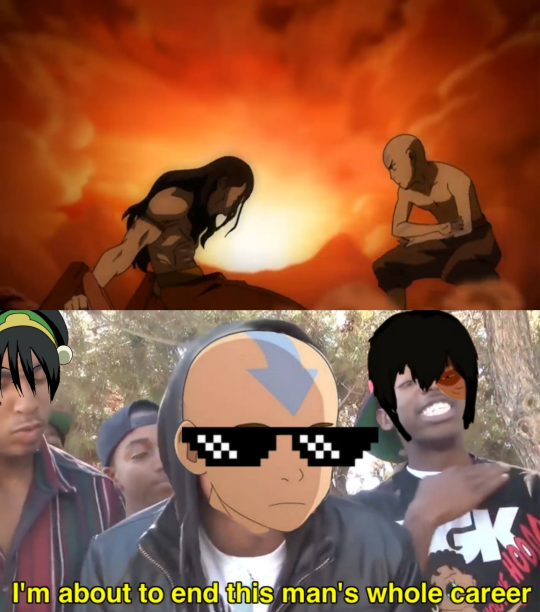
If you're asking me, this is way better than """killing him""". Case closed.
Getting this cleared up: The show didn't say that Aang is morally superior for this. It was solely about staying true to himself. Not a moral high ground.
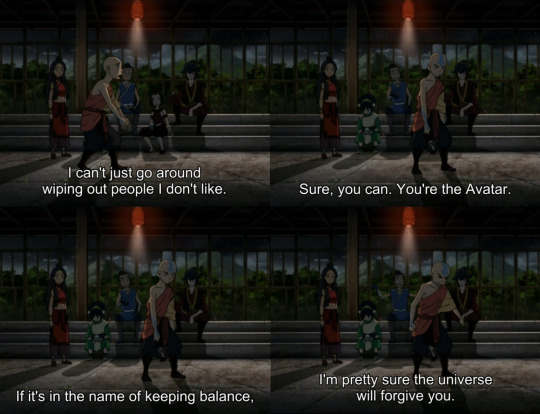
So when I hear people say it's problematic because it implies that sparing imperialistic dictators has some intrinsic goodness to it, (Ahem-Lily Orchard), I just can't agree. It was never about universal ethics, it was about Aang's culture and values.
Why Is This a Good Thing?
Aang loves his culture, and takes a lot of pride in it and its values. (See: in The Southern Raiders his first go-to to convince Katara to spare Yon Rah is his culture, rather than what such act would do Katara herself). He would have been ashamed if he had broken them. But right now they clash with his Avatar duties, with god-knows how many lives at stake. He needs to let go of his pride & shame, and become humble.
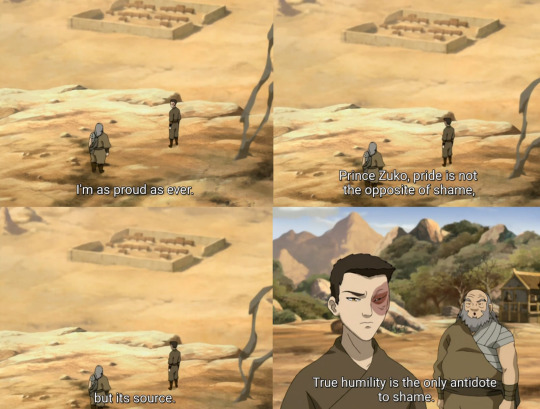
Just like Zuko humbling himself to the GAang before they accept him, or Sokka humbling himself to the Kyoshi warriors and Master Piandao, Aang could only speak to the the lion turtle after he'd given up, after he was humbled.
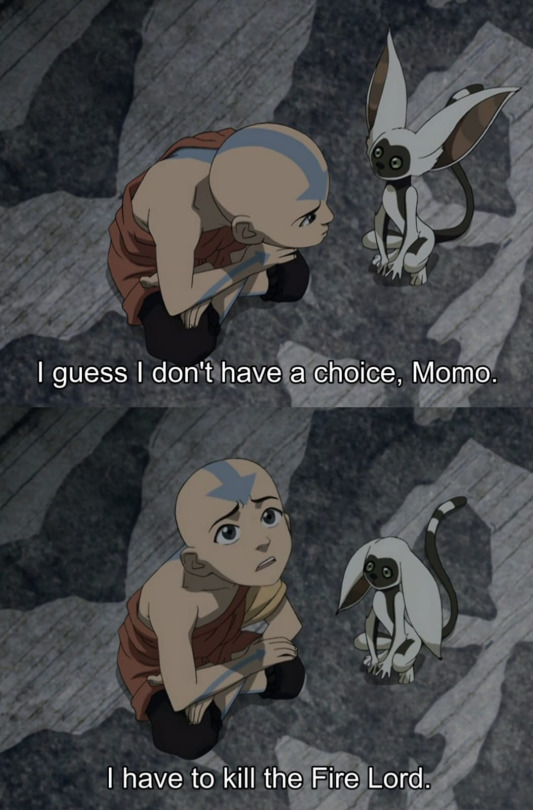
Even beyond Aang, it enhances the show's themes at large. A theme in A:TLA is paving your own path, and that you can do what you want despite the pressure. Your true destiny will come, you might be surprised by it, but it's yours and you're free to carve it.
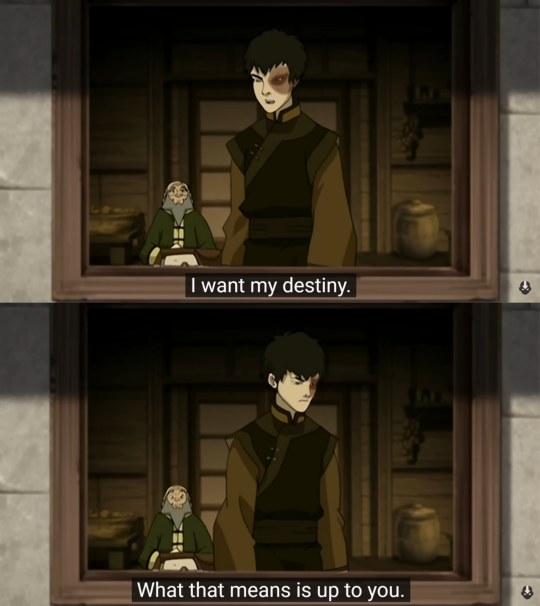
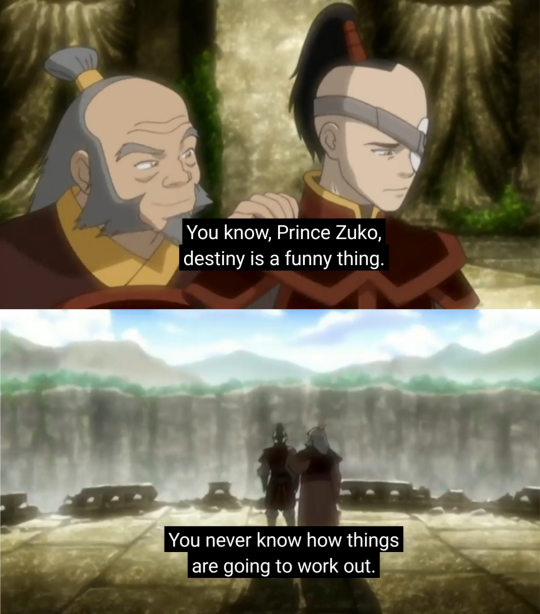
You just have to keep going, to continue to do the right thing, and your destiny will find you. Things have a way of working out in the end, eventually.
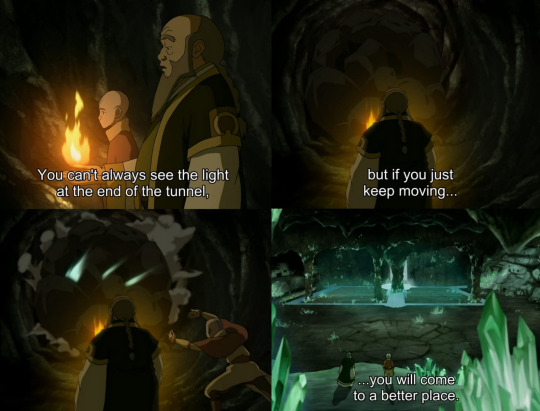
Sparing Ozai serves the theme, thus the show overall. Everyone told him it's his destiny to kill the Fire Lord and end the war. But he didn't agree, paving his own path, his own destiny, and all was well. The pieces fell in their place.
It is s amplified by the fact that if you read between the lines, he actually did follow all the previous Avatars' wisdom besides Yangchen's.
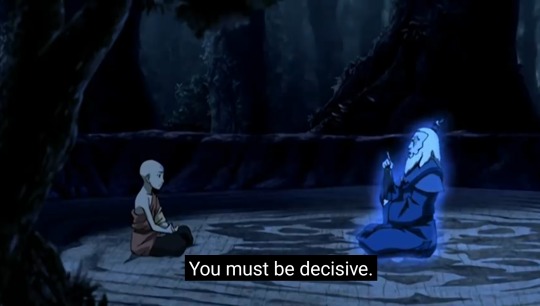
Aang knew what he wanted from the start. He isn't going to kill the Fire Lord. People (rightfully) tried to pressure him, but in the end, he stuck to his decision.
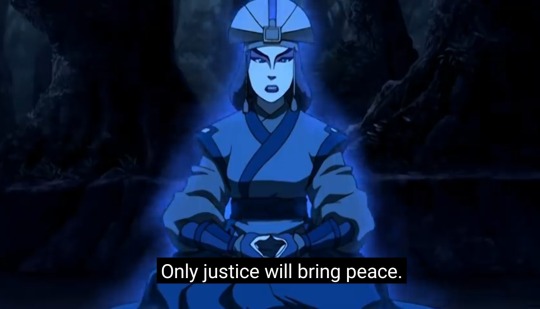
Justice was served. Aang took his bending away and put him to rot in prison for the rest of his life. There's more than one way to execute justice.
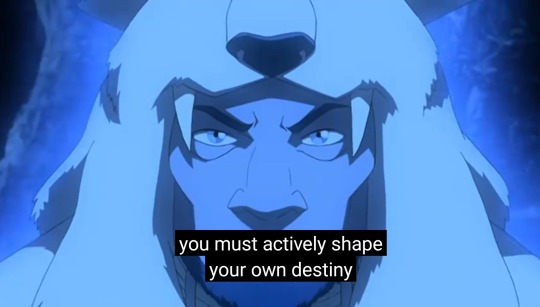
"... and the destiny of the world". That's exactly what Aang did. He followed his own path (staying true to himself) while saving the world (ending Ozai regime).
So that leaves us with Yangchen's advice. The one he didn't follow:
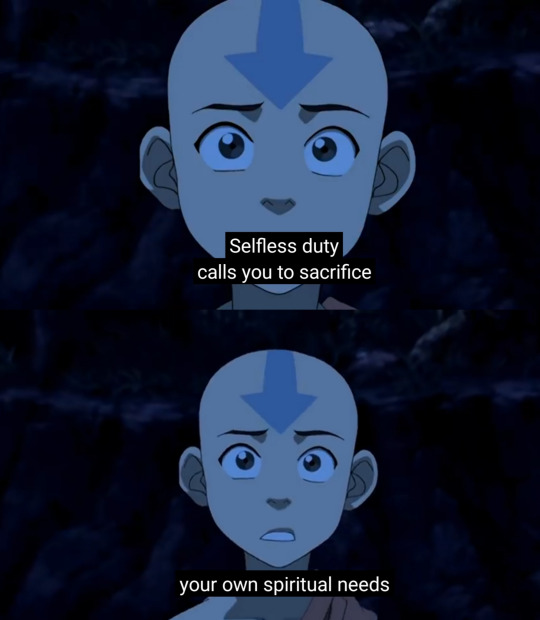
This opens another layer to this. Why doesn't Aang take the advice of a fellow Air Nomad? The one he should relate to the most? Because despite both being Avatars and Airbenders, Aang is the last. They're not the same. Yangchen is speaking from a place of privilege. She can carry the weight of the Avatar and not worry about the Air Nomads. Notice the wording: "spiritual needs". But it's deeper than that. In her time, they were there, they'll preserve their culture and values. Aang doesn't have that.
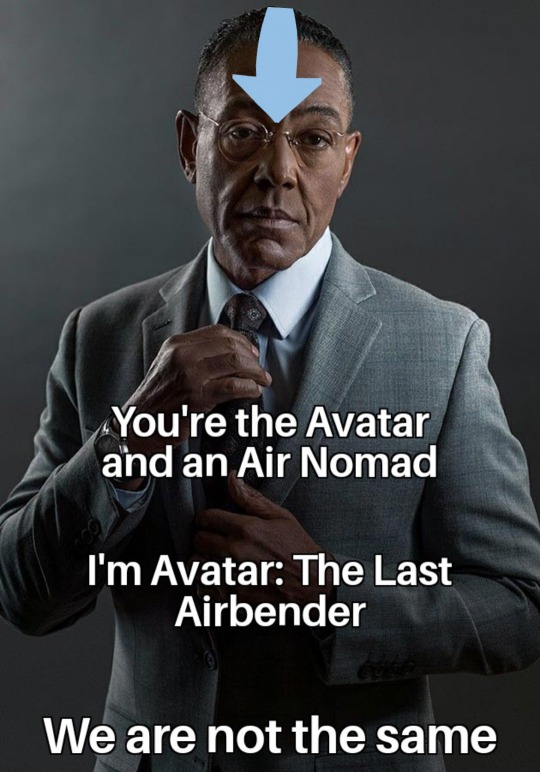
He's Avatar: The Last Airbender. He has both weights to carry. The decision to spare the Fire Lord, while protecting the rest of the world, is embedded in the show's title.
There's also something so incredibly powerful in Ozai being defeated specifically with Air Nomad values. A 100 years ago, during Sozin's Comet, the Fire Nation started the war by genociding them. When it comes back, the Avatar, the last Air Nomad, ends the war and stops the next genocide while preserving their values. The Fire Nation isn't going to push him to taint (one of) the last living aspacts of the Air Nomads, and Aang is shouting it – in the very same day the disaster occurred.
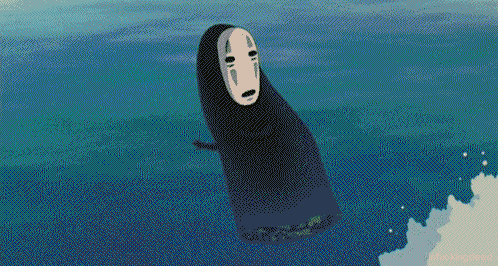
(Additionally I view this as a land mark of his character development since Siege of the North. He used spirit powers for murder, now he's using them for mercy).
(A:TLA is also a show made with kids in mind. They may not be able to make Aang kill Ozai. He got his bending stolen and sentenced to prison for the rest of his life. That's a more than serviceable punishment for a show aimed at kids).
(Ps: If Ozai had died Zuko would never have found out where his mother is).
The concept is fantastic. Nothing wrong there. But now, it's time for the critisism.
What's the problem then?
Despite looking in internet forums, it's entirely possible that I missed some things. With that being said, the Lion Turtles could have been foreshadowed better. As I stated, I don't mind it. But as far as I recall, it was foreshadowed once in The Library, and that's it. (Edit: It's also foreshadowed in Sokka's Master, but the point still stands).
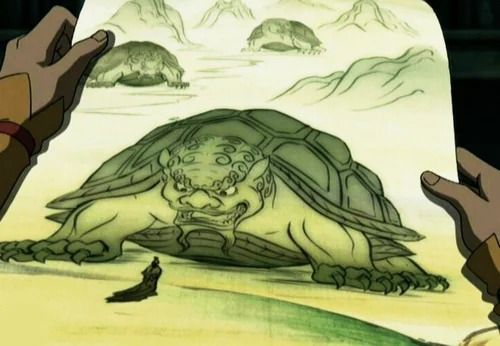
The Lion Turtle is a twist, it subverted expectations, but that doesn't mean it has to be a deus ex machina. That's what foreshadowing is for. It's the literary device to making a plot twist feel believable. The result is many fans, including me, feeling as though it came out of no where, even though it didn't.
Overall, I love that Aang spared Ozai. It ties into the themes of the show and Aang's role as the last airbender. It makes perfect sense, it's rather beautiful. However, I do wish the foreshadowing was better.
And for Anon, to apologize for the wait, I dedicate you this meme:
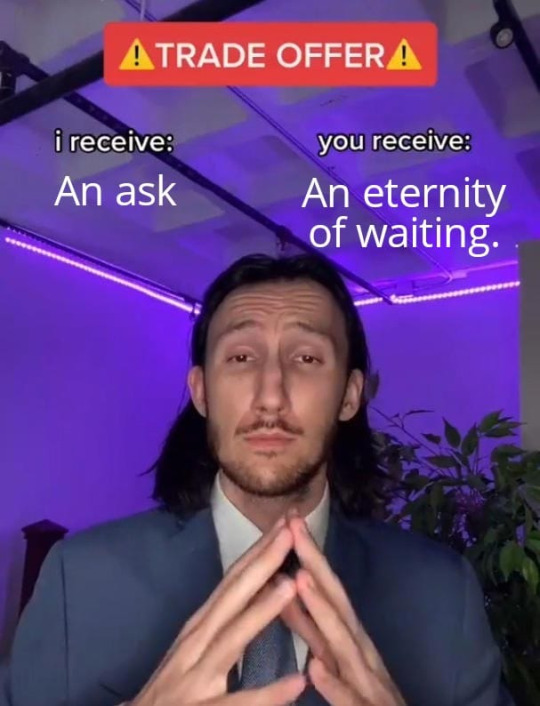
#tw genocide#aang#avatar aang#lion turtle#ozai#fire lord ozai#atla meta#avatar meta#aang meta#atla ending#atla finale#avatar: the last airbender#avatar the last airbender#air nomads#yangchen#kyoshi#roku#kuruk#avatar yangchen#avatar kyoshi#avatar roku#avatar kuruk#tw imperialism#avatar the last airbender meta#atla analysis#aang analysis#atla aang#atla critisism#iroh#uncle iroh
137 notes
·
View notes
Text
actually i just realized why interpretations of [atla] characters that are like “aang doesn’t lie” (blatantly textually false) or “katara would be offended by swearing” (sensically false) are so common. aang and katara are the most overtly ethical characters in the show, and people [subconsciously] associate morality with honesty and “clean language.” but none of aang’s principles preclude him from lying (he lies. a lot), just as nothing in katara’s moral code dictates that she must be a square (she is, in fact, the furthest thing from a square, and if you argue otherwise you are simply misremembering her character). i can understand why people think that an ethically principled person would consider honesty a virtue, even if aang clearly doesn’t, but the association between morality and language feels like a very christian (to broadly generalize) conception of “sin” and moral transgression that doesn’t map onto the atla characters whatsoever, and is entirely a projection of the largely american (and otherwise western) viewership. inversely, fanart that depicts “modern au” azula as some kind of goth abg with dyed hair and leather pants also attempts to map our internalized notions of how aesthetics are illustrative of morality onto a character who would clearly never present herself in any way countercultural. if azula were suddenly transported to montclair, new jersey, she would be a conservative and present herself accordingly (most likely scenario she would dress like shiv roy). i’m not saying all this to condemn the activity of projecting onto characters, as i clearly participate and engage in these fandom-cultural practices, but rather that i think it’s important we be mindful of what connotations are carried in certain interpretations and depictions, because even our subconscious associations can stem from a legacy of cultural contexts, often embedded within harmful institutions we may not consciously wish to associate with, or that are simply not useful or relevant associations when thinking through whatever thing we are in the process of fandomitizing.
#is fandomitizing a term. if not i just coined it#analysis#katara#aang#azula#cite the primary source read the text format your citations in mla or chicago#etc etc
3K notes
·
View notes
Text
I actually like zutara as a concept, it's a ship I'll casually read fics about them sometimes.
it's just zutara fans are fucking delusional. Stop treating their Canon partners as abusive when it's the complete opposite. Especially Mai.
Aang isn't a misogynistic monk that forces katara to be his house wife. If he did katara would leave him in a millisecond. He actually cares so much about her. It's actually Canon HE cooks and accommodates his cultural food with kataras.
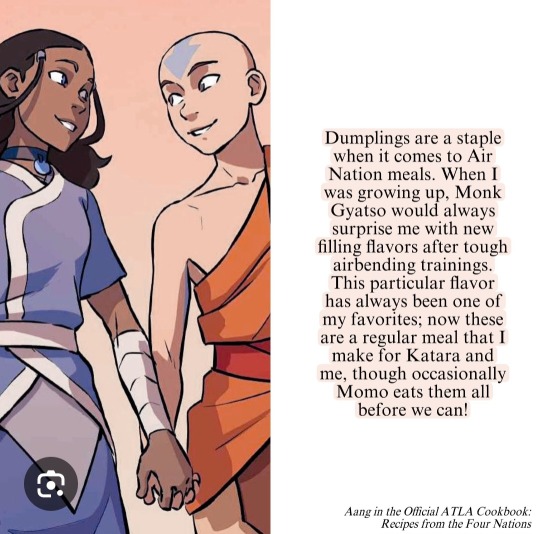
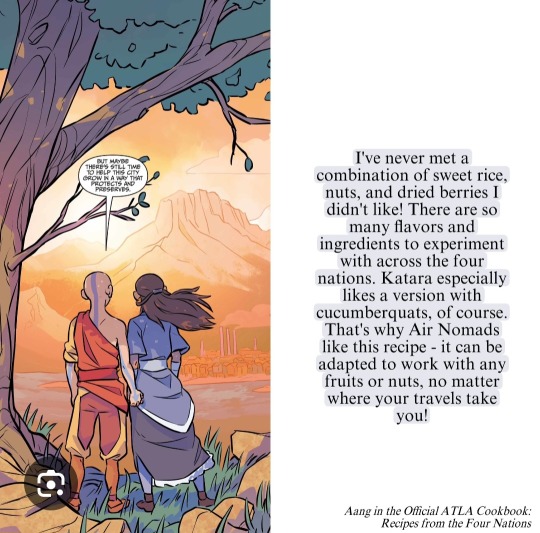
And Mai was literally ready to die for zuko. Even when they just broke up, she was ready to get electrocuted by azula if it wasn't for ty lee chi blocking azula.
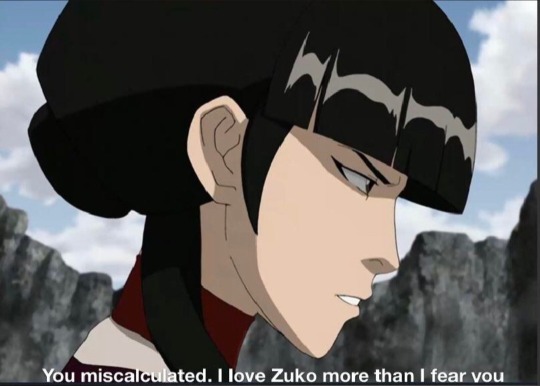
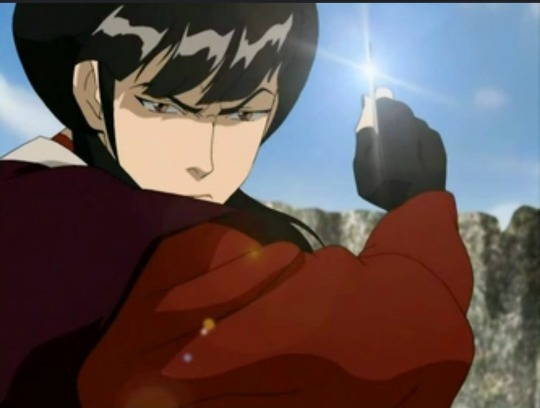
I'm aware it seems like she doesn't care about him the way she's quiet and aloof but I understand where she was coming as someone who somewhat has similar tendencies of being a little awkward when trying to show emotions and it coming off as being uncaring or rude. But at the end of the day she really shows she loves him, so people saying she's abusive is completely inaccurate to her character.
Her bottling up her emotions was taught by her parents as she explains in the beach episode somewhat where she had to worry about her father's reputation all the the time, forcing her to be quiet as a form of behaving.
Personally I think her quiet personality fits with Zukos loud ass, especially giving him a reality check during the beach episode calling him out for being angry all the time and how he needs to keep it in check.
Zutara is a nice ship I agree but you can ship it without mischaracterizing tf out of thier Canon partners.
#prince zuko#atla zuko#fire lord zuko#zuko#katara atla#katara avatar#katara#kataang#katara of the southern water tribe#mai atla#mai avatar#atla maiko#maiko#pro maiko#avatar aang#avatar: the last airbender#avatar#avatar the last airbender#atla#character analysis#shipping discourse
959 notes
·
View notes
Text
Katara and Mutuality in Relationships
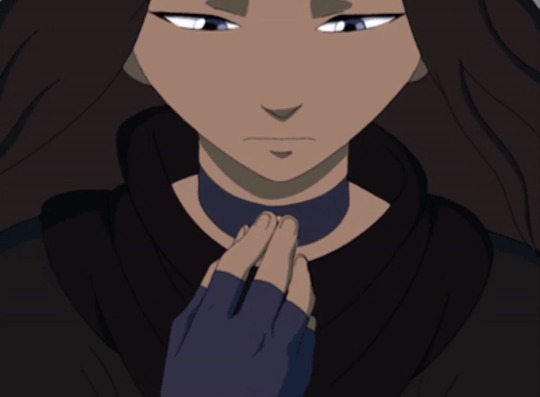
There are lots of conflicting opinions about which characters Katara felt attraction towards, which characters she didn’t, and how long she felt that attraction. I see in most cases, people point to quick clips of her faintly blushing or kissing another character on the cheek as evidence, but I think these kind of takes miss the nuance of the purpose attraction serves in a story.
Most importantly, I see these characters treated as if they are actually people capable of making their own decisions. It’s important to remember that these are fictional characters. They don’t make their own choices; the writers make their choices for them for the purpose of telling a story. From that standpoint, it’s more valuable to examine how a character’s story and narrative themes tie into their relationships with other characters. Animators can shove in a kiss or a blush wherever they want, but it’s harder to demonstrate through storytelling how and why two characters might feel attraction towards one another, and how a relationship between them would develop both characters and contribute to the overarching themes of the story.
In other words, when discussing which characters Katara is “attracted” to, I’m discussing which relationships and actions within the narrative build on her established story and arc. Romance is always integrated into a story for a reason, and considering that reason is important.
Unfortunately, ATLA is very much a product of its time in this way. It’s easy to see what romance adds to the arcs of the male characters—but not so much with the female characters. All three canon relationships (kataang, sukka, and maiko) follow this trend to some degree. The primary purpose of the woman in this narrative is to act as a prize for the man for performing some good deed. Once they’re together, she ceases having her own motivations and becomes an extension of the male character she’s dating. This is pretty blatant with Suki—she barely had a personality in that later seasons; she is there to be Sokka’s girlfriend. Similarly, Katara becomes a completely different character—she’s even animated differently—when the narrative pushes her into romantic scenes with Aang. Her character is flattened.
So what is Katara’s arc, and how do the romantic interactions she has throughout the series contribute to this?
Well, that could be a whole other essay itself, but to put it simply, Katara’s arc is one of a young girl devastated by grief at a young age clinging to hope that she has the power to fight and change the world for the better. Which she does as she gains power and confidence throughout the series—culminating in her defeating Azula in the finale.
But the part I want to focus on here is how Katara connects with other characters. She connects with them over shared experiences of grief and loss.
Take Haru, for instance.
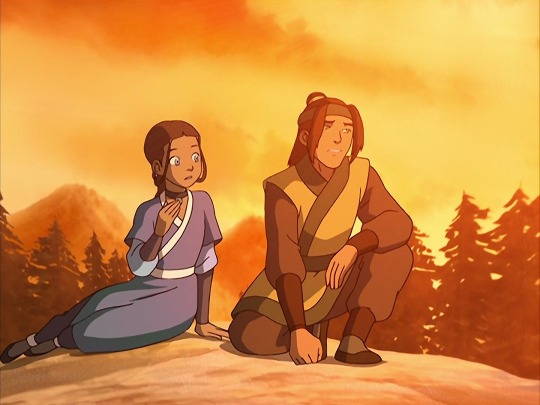
Haru: After the attack, they rounded up my father and every other earthbender, and took them away. We haven't seen them since.
Katara: So that's why you hide your earthbending.
Haru: Yeah. Problem is…the only way I can feel close to my father now is when I practice my bending. He taught me everything I know.
Katara: See this necklace? My mother gave it to me.
Haru: It’s beautiful.
Katara: I lost my mother in a Fire Nation raid. This necklace is all I have left of her.
Haru: It’s not enough, is it?
Katara: No.
This isn’t just a throwaway moment; it’s an important character moment that leads up to growth and the progression of Katara’s overall story, both in this individual episode and in the whole series.
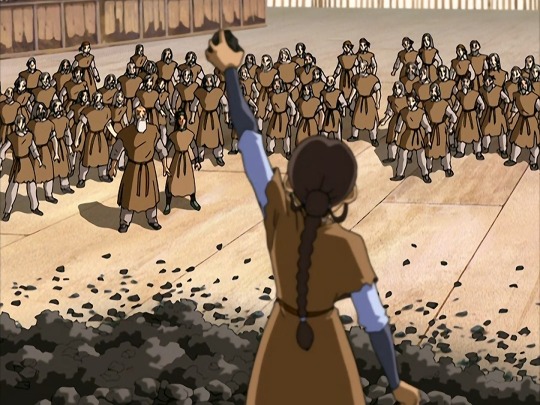
Katara finds her power in the connections she’s able to make with other characters. It’s a powerful driving force for her that makes her a strong character even before her bending abilities develop. Imprisoned was such an important episode to establish who Katara is and what her power is, and adds so much to her arc.
But there is one line in particular from the above exchange that also stands out: Haru says “it’s not enough, is it?” and Katara agrees. Even this early in the series, we’re establishing the fact that despite her drive and hopeful outlook, Katara feels deeply hurt, she feels a deep sense of loss that she opens up about to other characters in moments like these. But unlike Haru…Katara can’t go rescue her mother. Her mother is dead, and we see her grapple with that grief throughout the series.
Another character she reaches out to like this is Jet.
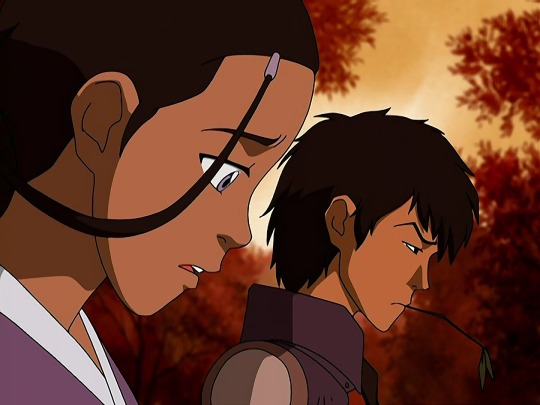
Jet: Longshot over there? His town got burned down by the Fire Nation. And we found The Duke trying to steal our food. I don't think he ever really had a home.
Katara: What about you?
Jet: The Fire Nation killed my parents. I was only eight years old. That day changed me forever.
Katara: Sokka and I lost our mother to the Fire Nation.
Jet: I’m so sorry, Katara.
Another important note about Jet is that there are explicit romantic feelings from Katara in this episode. Again, Katara empathizes with another character through a shared sense of loss. Sadly, in this case, Jet manipulated her feelings and tricked her into helping in his plot to flood the village…but those feelings were undeniably there.
That was the tragedy in this episode, but it also gives the audience so much information about Katara as a character: what motivates her, and what she wants. Katara is established as a character who wants someone who will connect with her and empathize with her over her loss—her greatest sense of trauma. She wants to help others but also receive support in return. The reason why she was smitten with Jet, beyond just initial attraction, is because he gave her a sense of that before Katara realized his true motivations.
A lot of people make the claim that Aang is good for Katara because he also feels a sense of great loss and trauma. And while on paper that’s true…does he really demonstrate that? I just gave two examples of characters Katara connected with this way, and both responded with deep empathy to what she said. Very early on in the show—the third episode—Katara attempts to connect with Aang the same way. How does he respond?
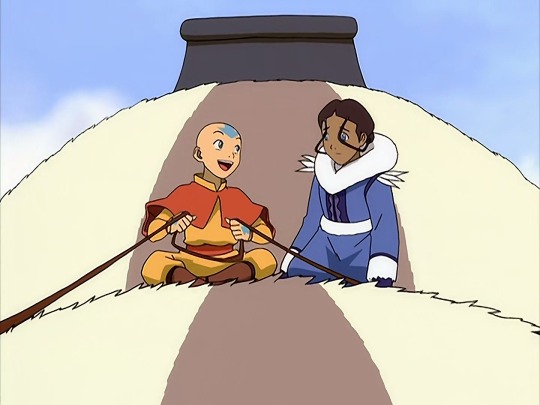
Katara: Aang, before we get to the temple, I want to talk to you about the airbenders.
Aang: What about 'em?
Katara: Well, I just want you to be prepared for what you might see. The Fire Nation is ruthless. They killed my mother, and they could have done the same to your people.
Aang: Just because no one has seen an airbender, doesn't mean the Fire Nation killed them all. They probably escaped!
Just compare this exchange to Haru and Jet. No effort to empathize, not even a “sorry for your loss” or anything. It’s a stark contrast, and the reason for that is because this narrative entirely centers Aang. Katara’s narrative always seems to be secondary to his when they’re together—which is exactly my point when I say this relationship has a fundamental lack of mutuality. It’s built that way from the beginning of the series. It does not add to Katara’s arc nor establish what about this dynamic would attract her.
And, look, before someone jumps down my throat about this…I’m not saying Aang is a horrible person for this response. I think it’s a sign that he’s immature and has a fundamentally different approach to problems than Katara. Katara is a character who has been forced to take on responsibilities beyond her years due to being a child of a war-torn world. Aang’s approach to problems is avoidance while Katara never had that luxury. It doesn’t mesh well.
This is all in Book 1. I honestly could have gotten on board with Kataang if the series meaningfully addressed these issues…but it didn’t. In fact, they actually got worse in some ways.
Back to Katara’s mother. We’ve established that this is a core part of Katara’s character and like in the scene with Haru, she indicates that this is an unresolved issue that pains her. But then, in Book 3, Katara actually does get a chance to confront this pain.
This would have been a powerful moment. Surely the character who is meant to be her partner, her equal, would have been there for her. Surely he would have understood and supported her, fulfilling her narrative and adding to her story.
But Aang didn’t do that. I won’t go into details because there are a million analyses out there on The Southern Raiders, but Aang’s response to Katara was the opposite of understanding. He got angry with her, insinuated that she was a monster for wanting revenge, and tried to dictate her behavior according to his own moral values. And importantly, from a narrative standpoint, he did not go with Katara. One of the most important events in her arc, and Aang didn’t support her—he actually tried stopping her. He didn’t contribute to her growth and development.
Also noteworthy:
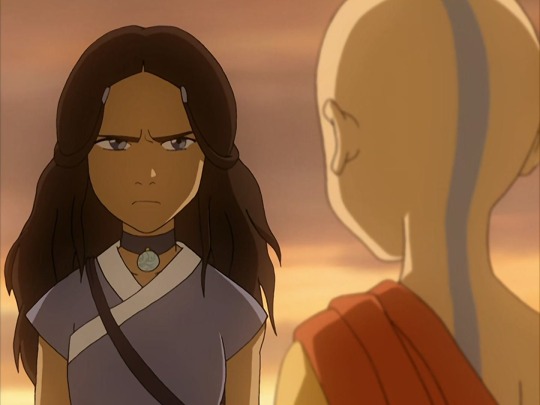
Katara: But I didn’t forgive him. I’ll never forgive him.
Even at the end of the episode, Aang clearly doesn’t understand at all what Katara is feeling. This line demonstrates it perfectly. He thinks she forgave him when that wasn’t the case at all…but of course, he didn’t even accompany her, so he didn’t see what actually took place. His worldview is fundamentally different from hers, and he’s consistently too rigid in his morality and immature to center Katara’s feelings.
Throughout Katara’s whole arc, her most significant character moments, Aang’s character just doesn’t come through the way Katara’s constantly does for him. Their narrative lacks mutuality. When Katara and Aang are together, she becomes an accessory to him. The ending scene is a perfect demonstration of this.
Now, to address the elephant in the room.
Which character does actually add to Katara’s narrative and support her growth as a character?
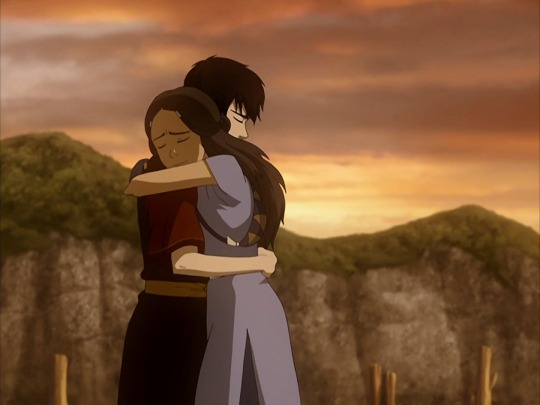
Correct! I just talked about how important The Southern Raiders is to Katara’s character and story, how it’s a chance for her to finally address the grief she’s been carrying since Book 1. And who stood by her side throughout this pivotal moment? Right—Zuko did.
You can talk all you want about how he’s a “colonizer” while Aang’s people suffered genocide, but you’re forgetting that “show, don’t tell” is one of the most basic aspects of storytelling. The fact is, despite how it looks on paper, Zuko was the one there for Katara at her critical moments. Zuko empathized with Katara more than Aang ever did—as demonstrated in this episode. Zuko never once brought up his own cultural values. Zuko never once told Katara what to do. Zuko’s position was that Katara should be the one to decide, and that he would support any choice she made. He supported her decision to spare Yon Rha, but he would have also supported her if she decided to kill him. I actually found this episode to be a satisfying reversal to what is typically seen in TV—for once, the female character is centered while her male counterpart takes the backseat and becomes a supporting role to her narrative.
Even before this, Zuko is shown to empathize with Katara.
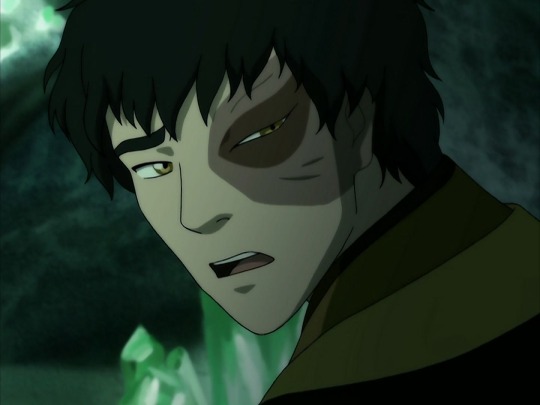
Zuko: I’m sorry. That’s something we have in common.
I think what gets me about this scene is the fact that he’s still Katara’s enemy, and she was just yelling about how she hates him and his people. But despite that, Zuko still empathizes with Katara. She is fundamentally human to him, and he expresses that to her in a way that allows them to connect. Zuko stands to gain nothing from this. It’s true that Azula entered the picture and twisted things around—but in this moment, Zuko’s compassion is genuine. His instinct was to respond to her grief with empathy, just like she consistently does for other characters.
And finally, how else does Zuko add to Katara’s arc?
I don’t think there is any more perfect of an example than the finale itself—the culmination of the arcs and development of all characters.
Zuko and Katara fight together. In a heartbeat, Zuko asks Katara to fight by his side against Azula, because he trusts her strength. She’s his equal—both in his mind, and in a narrative sense.
Then, this:
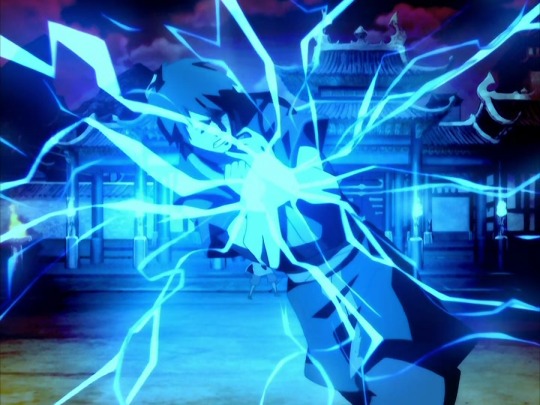
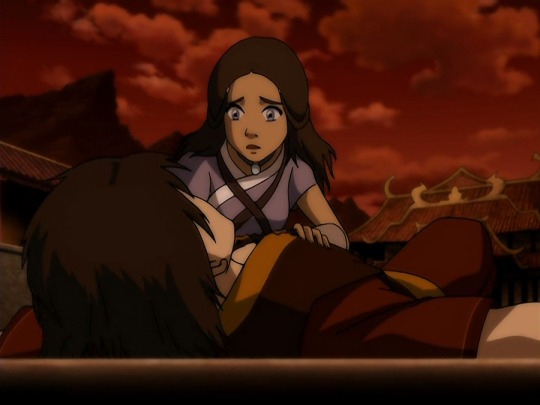
Both of their roles are so critical in this fight. They both save each other. The scene has such raw emotion to it. These characters were together at the conclusion of their respective arcs for a reason.
This is the perfect conclusion to Katara’s arc. She just played a critical role in ending the war that has caused her trauma her whole life. She just demonstrated her mastery of waterbending (another thing she’s dreamed of throughout the series) by defeating the world’s most powerful firebender during Sozin’s Comet. Even though she had help as all characters do, these are victories that belong to her and demonstrate the growth and power of her character. And to top it all off? She was able to save Zuko’s life. She didn’t have to endure the pain of feeling helpless to do anything while someone else died for her; this time, she had an active role, she changed her fate, and she prevailed. Zuko plays an important role in Katara’s story without dominating it. They perfectly represent mutuality. They add to each other’s stories. Their narratives become stronger when they’re together, without one diminishing or sidelining the other.
So, from that standpoint, that’s why I always see the attraction between Zuko and Katara and why I see it lacking between Aang and Katara. Zuko and Katara’s story doesn’t need some cheap little throwaway moments to shine. It’s integral to both characters’ stories. We are shown not told of the way these characters feel about each other. Given everything we know about Katara, her goals, her values, her past loves…absolutely everything points to Zuko being the true subject of her feelings.
Because let’s be honest. The ending I just described is so much more powerful and so much more Katara than seeing her being relegated back to a doe-eyed love interest for Aang to kiss. It hardly even made sense—Katara played no role at all at the culmination of Aang’s arc. She was relegated back to a love interest, rather than the powerful figure we saw fight alongside Zuko.
#zutara#katara#zuko#atla#anti kataang#canon critical#jet#haru#katara deserved better#aang critical#meta#analysis
395 notes
·
View notes
Text
Let's Talk About How Book 3 Ruined Aang
If you've seen any of my prior ATLA posts, you know that I don't hate Aang. In fact, I quite liked him in Books 1 and 2. He was flawed, as all characters should be, but the show didn't shy away from those flaws or justify them. He was called out for burning Katara and rushing his firebending, Sokka and Katara were rightfully upset when he hid Hakoda's letter, he willingly owns up to the fact that his actions helped drive Toph away, and his entire arc after losing Appa and finding hope again in The Serpent's Path was beautifully done.
(Hell, even in The Great Divide Katara says what Aang did was wrong and he agrees. It's played for comedy, but the show still makes the effort to point out that what he did wasn't the right thing to do. You're just meant to understand that he was fed up and acted off of that)
Those flaws and mistakes were addressed and improved upon and helped Aang to grow as a character.
But for some reason, that aspect of Aang's character was completely flipped in Book 3.
The best examples of this are in both TDBS and EIP. Both the show and the fandom are too quick to brush off that Aang kissed Katara twice without her consent, one of which after she explicitly said she was confused about her feelings.
(And yes, she is angry in response and Aang calls himself an idiot. But after this, it isn't really addressed. They go on like nothing happened for the rest of the episode. Aang's lamentation comes from screwing things up with her romantically, not that he violated boundaries)
The show never really addressed why what he did was wrong. Not only because he wasn't given consent, but also because both times he isn't thinking about what Katara wants. In both instances, Aang is only thinking about himself and his feelings. This is something that persists through a lot of the third book. And by Sozin's Comet it ultimately ruins any character development he had built up in the second book.
One thing I feel was completely disregarded was the concept of having to let go of Katara in order to master the Avatar State.
For me, the implication wasn't that he had to give up love or happiness necessarily. He was emotionally attached to and reliant on Katara, to the point where she was needed to stop him from hurting everyone around him and himself. This is obviously detrimental to his functionality as the Avatar. And the point of him "letting her go" wasn't that he had to stop caring about her, it was that his emotional dependency on her was stopping him from being the Avatar he needed to be and that was what needed to be fixed. I don't even think it's about the Avatar State itself, it's about being able to keep your emotions and duty as the Avatar separate.
(If you look at Roku, he loved and had a wife. It wasn't his love for her that messed everything up, it was his attachment to Sozin. He wasn't able to let Sozin go and not only did he lose his life for it, the world suffered for it. It's the unhealthy attachments that seem to be detrimental, not love itself)
And Aang realizes that in the catacombs, which is how he's able to easily enter the Avatar State and seemingly control it. He let Katara go.
So then why does it seem like his attachment to Katara is not only stronger, but worse in mannerism? He liked Katara in Books 1 and 2- obviously- but he was never overly jealous of Jet or Haru. He only makes one harmless comment in Book 2 when Sokka suggests Katara kiss Jet.
But suddenly he's insanely jealous of Zuko (to the point of getting frustrated with Katara over it), off the basis of the actions of actors in a clearly misrepresentative play. Katara showed a lot more interest in Jet and Aang was completely fine with it.
(Speaking of EIP, Aang's reaction to being played by a woman was interesting. He wore a flower crown in The Cave of Two Lovers. He wove Katara a flower necklace. He wore Kyoshi's clothes and makeup and made a funny girl voice. He willingly responded to Twinkle Toes and had no issue being called that. And for some reason he's genuinely upset about being played by a woman? Aang in Books 1 and 2 would have laughed and enjoyed the show like Toph did. His aversion to feminity felt vastly out of character)
I guess my point is, why did that change? Why was Aang letting go of Katara suddenly irrelevant to the Avatar State? It felt like him letting go was supposed to be a major part of his development. Why did that stop?
Myself and many others have talked about The Southern Raiders. The jist of my thought process about it is his assumption that he knew what was best for Katara. And the episode doesn't really call out why he was wrong. Maybe sparing Yon Rha was better for Katara, maybe it wasn't (the only one who's allowed to make that choice is her). Pushing forgiveness? That was wrong. But the episode has Zuko say that Aang was right when the course of action Katara took wasn't what Aang suggested.
Katara's lesson here was that killing him wouldn't bring back her mother or mend the pain she was going through and that Yon Rha wasn't worth the effort. That's what she realizes. Not that she needed to embrace forgiveness. How could she ever forgive that? The episode saying Aang was right wasn't true. Yes she forgives Zuko, but that wasn't what Aang was talking about. He was specifically talking about Yon Rha.
And that was wrong. Aang can choose the path of forgiveness, that's fine. That's his choice. But dismissing Katara's trauma in favor of his morals and upbringing wasn't okay.
I know it sounds like this is just bashing Kataang. But it's not simply because I don't like Kataang, in my opinion it brings down Aang's character too, not just Katara's. But let's steer away from Kataang and Katara for a minute.
The one thing that solidifies Aang's character being ruined in Book 3 for me is the fact that he- at the end of the story- does the same thing he did in the beginning.
He runs away when things get hard.
Aang couldn't make the choice between his duty and his morals. So he ran. Maybe it wasn't intentional, but subconsciously he wanted an out. And this is really disappointing when one of the things he was firm about in Book 2 was not running anymore. His character went backwards here and that's not even getting into the real issue in Sozin's Comet.
There's been contention about the Lion Turtle intervention. For many- including myself- it's very deus ex machina to save Aang from having to make a hard decision. And that in turn doesn't reflect kindly on his character.
Everyone- Sokka, Zuko, Roku, Kyoshi, Kuruk, and Yangchen (who was another Airbender and was raised with the same beliefs he was and would understand which was the whole point of him talking to her)- told him he had to kill Ozai. They all told him it was the only way. And he refused to listen to any of them, rotating through his past lives until he was given the answer he wanted.
And before anyone says that I'm bashing Aang for following his culture, I'm not. Ending the war peacefully, in my opinion, wasn't the problem. In a way, I think it allowed the world to heal properly. However, that doesn't make up for the fact that Aang refused to make a choice and face the consequences of that choice. Instead, he's given an out at the very last second.
Even if he couldn't kill Ozai and someone else had to deliver the final blow, that would have been better than the Lion Turtle showing up and giving him a power no one's ever had before. It would have been a good compromise, he doesn't have to have blood directly on his hands but what needs to be done needs to still get done. It would also show that being the Avatar isn't a burden he has to bear alone. That when things get hard, he can't run away but he can rely on the people closest to him to help him through hard decisions.
All these issues aren't necessarily a problem with Aang. Aang prior to Book 3 didn't have most of these problems. This is a problem with the way he was handled
#aang critical#anti aang#tagging just in case#i don't want aang stans accusing me of cross tagging#it's really not anti aang tho#long post#anti bryke#this is their fault#look how they massacred my boy#anti kataang#katara deserved better#she's not the focus here#but i thought I'd add that there#character analysis#atla critical#anti book 3#which is kind of an exaggeration#because a lot of book 3 is great#it's just most of the latter half
223 notes
·
View notes
Text

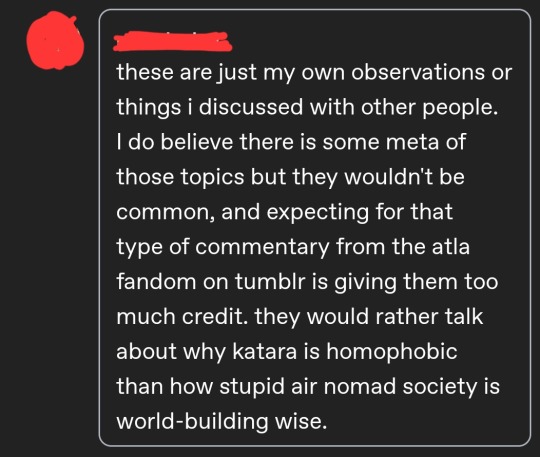
This is why I prefer to let other people take the mic when it comes to fandom/moral critique. Even on my best day, I couldn't publish a fandom-critical take half as comprehensive and coherent as this one.
Reposted anonymously with permission from OP, who understandably does not want to deal with hate comments/hate asks for expressing these opinions.
(Hopefully the screenshots load properly on tumblr, I know the first one is incredibly long 😅)
#zutara discourse#anti anti zutara#the colonizer argument#fandom analysis#anti purity culture#anti ship war#anti kataang#anti maiko#anti aang#anti mai
187 notes
·
View notes
Text
I don't ship Zutara that much but M*!k0 shippers who call it "colonizer x colonized" actually annoy me so badly 💀they literally undermine Zuko's whole ass arc and growth just bc they dislike Zutara then reduce him to some idiot colonizer as if he never had literally the best growth in the series. His whole arc is about NOT BECOMING a colonizer. How tf are you going to say that just bc you dislike Zutara when his whole arc is about becoming the opposite of a colonizer and even getting full on episodes of him getting Katara's forgiveness. You're literally taking away all of Zuko's growth, suffering, and development. 💀M*!k0 shippers are actually so dumb like why are you even defending that badly written ship lmao
#anti maiko#maiko anti#zuko x mai anti#zutara#analysis#anime#anime analysis#my meta#meta#atla meta#avatar#atla#avatar the last airbender#media literacy#avatar aang#zuko#katara#pro zuko#pro katara#prince zuko#not a big zutara person but seeing maiko shippers call zuko a colonizer just to upscale maiko literally baffles me like are you illiterate
150 notes
·
View notes
Text

something something fire and water are opposites… something about air and earth being opposites… something about moon and sun, and an earthbender appearing to an airbender in a place of strong spiritual connection… something or such about waterbending techniques being used to create new unique firebending maneuvers… oh yes something about age and maturity in relation to peers… sometimes in regards to push and pull… or maybe equal and opposite action and reaction and how balance in all things (especially the elements) is always needed and as such is a primary reason for the avatar’s existence… mmhhh yes yes
#atla#zutara#taang#avatar the last airbender#zuko#katara#aang#toph#toph beifong#fire lord zuko#avatar aang#master katara#aang x toph#zuko x katara#atla netflix#avatar netflix#atla meta#atla discourse#atla analysis#atla live action#atla live action tv show
184 notes
·
View notes
Text
The Ember Island Players stage play is just so bad. It’s not a good play but the accurate theatrics just gets me so hype and reminds me of high school drama club. They made Aang effeminate and weird because he’s a little boy, following the tradition of women portraying little boys in media and also because it’s to demean him as presented with the people laughing and Aang justifiably getting upset. They made Katara an over emotional, shallow person because they don’t want to admit that a young girl can be taken as serious as she should be and that extends to Toph when they portray her as a buff, large man because they don’t want to admit they were bested by a little girl. Zuko is shown as an emotional loser who will inevitably die a traitor which cements that it’s Fire Nation propaganda and instilled fear in the group. Sokka is portrayed near perfectly according to Sokka himself for the most part, because he’s never been taken seriously as a non-bender. It’s so meta and so good but simultaneously so bad and hilarious. Imagine being in their shoes.
#atla#Gaang#analysis#ember island players#Aang#Katara#Toph#Toph beifong#avatar Aang#Zuko#Firelord zuko#Sokka#Suki
787 notes
·
View notes
Text
I wanna talk about all my fav ATLA ships cuz being a multishipper can suck sometimes
I wanna look at ship tags and not see hate for another ship in them
SPREAD THE LOVE
KatAang: Classic friends to lovers. Couples who commit ecoterrorism together stay together
TAang: She was a punk He did ballet what more can I say. But like actually they're so fun to analyze with what we have in canon, they legit give soulmate vibes.
ZuTara: SHOT THROUGH THE HEART another fun one to analyze, opposites attract/enemies to lovers it's a good time
KaToph: They're defined by overcoming their "weaknesses" Katara fought for her right to be a master despite her gender and became one of the most powerful benders because of her will to fight. Toph literally invented a whole new bending style BECAUSE of her blindness. Love them
MaiLee: Bad bitches deserve bad bitches, we love a sunshine and sunshine protector. They're fighting styles compliment each other as do their personalities
MaiKo: 'I love Zuko more than I fear you" will never not be the hardest line in the show. *doesn't care she got pickles* "HOW FUCKING DARE YOU SHE SAID NO PICKLES"
Ty Luki: I just want Suki to show TyLee the ropes of being a kyoshi warrior. The have so much they can teach each other also if you like the Airbender! TyLee headcanon there's something poetic about her unlocking her powers with kyoshi's fans
YueTara: MOON AND OCEAN NEED I SAY MORE
ZUe (I actually don't know their ship name) we in rare pair hell but SUN AND MOON NEED I SAY MORE also applies to Yue x Azula you guys come up with the coolest scenarios that put the either fire sibling in the north pole, this fandom is so creative
ZuKKi: Let Sokka pull lol but actually a King and His Guard and King and his Ambassador, it's like Sukka is great but make it better
Mai TyLee and Suki should be a bigger ship cuz I swear I'm the only one that sees it (help me name them)
Tell me about your favorite ATLA ships I freaking love these characters and I love when they love each other
#katara#zuko#aang#toph#yue#sokka#suki#mai#ty lee#azula#rare pair#ot3#ships#multishipper#atla#avatar the last airbender#ship analysis#kataang#taang#katoph#zutara#mailee#maiko#ty luki#yuetara#zue#zukki#zuki#sukka
84 notes
·
View notes
Text
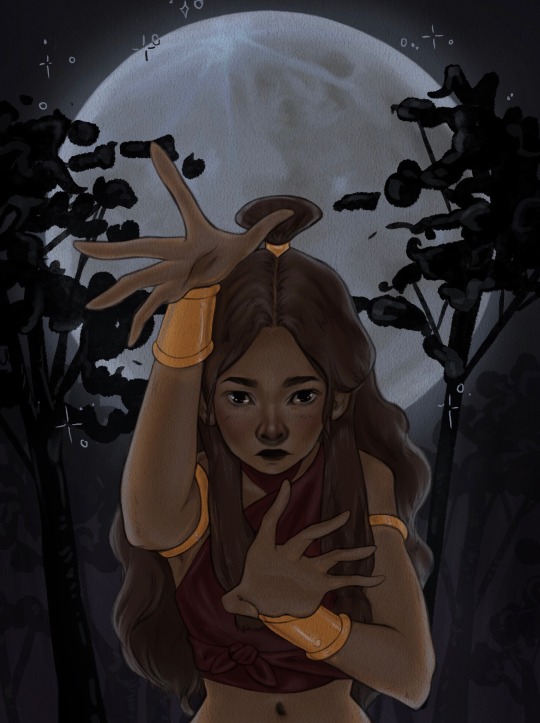
i rise with the moon
- artist musings under the cut -
since i first watched atla as a kid, i've wanted katara to embrace blood bending. she was so powerful and imo the skill wasn't as immoral as the show depicted it.
also, i rewatched the puppetmaster ep last night, and i thought about how intense of a character hama was. she found a way to survive being held and tortured as a prisoner of war for decades, developed a new form of waterbending to escape, and then the ptsd from that resulted in her becoming a serial killer/kidnapper. fascinating. tragic. i want to know more.
then katara emotionally connected to this woman from the same culture, who could teach her southern water tribe bending techniques that she thought were lost to genocide. but hama had turned to violence against non-military citizens of the fire nation, much like jet did, because of the abuse (war crimes?) they endured. it's another character that katara related to about the affects of the war, only to learn that they chose violence. reflecting on this, the scene where she chose not to kill the man who murdered her mother is even more powerful because she chose to break that cycle.
#this is the most show analysis ive ever done#atla#avatar the last airbender#katara#waterbending#avatar#digital art#digital illustration#digital painting#artists on tumblr#illustration#painting#art#drawing#procreate#aang#my art#curs-ed-cat
257 notes
·
View notes
Text
I never really thought about this until now, but. why did Aang never express any opinions on Azula whatsoever after she literally killed him
Like, am I supposed to believe that he's not deeply afraid of her after that? Or at least angry? She left a scar on his back that interrupts his culturally significant tattoos, and we just... never see him notice or care about that??
I'm currently about halfway through Book 3 on my rewatch, and the fact that nobody's even told Aang on-screen that Azula was responsible for what happened is more than a little absurd. I'm pretty sure they acknowledge it at some point, but in some kind of offhanded way that really doesn't do the matter justice.
It honestly feels like the show didn't want to touch that plot point with a ten foot pole, only mentioning it when it was absolutely necessary to further the plot on Zuko's side of things. Which is weird! Why kill your protagonist on-screen, leave him with two permanent scars when he's revived, and then never have him confront or even talk about the person who killed him again???
Aang deserved to have a significant dynamic with Azula after what happened at the Crystal Catacombs and the fact that they dropped the topic almost entirely two episodes later lowkey fills me with rage
#avatar the last airbender#atla#aang#azula#analysis#meta#Not sure if this really counts as an analysis but I'm tagging it anyway#Also by 'two episodes later' I mean the second episode of Book 3#Can you imagine it?? the intrigue?? the parallels with Zuko over being scarred by the Fire Nation royal family???#If the Netflix version gets this far and keeps the same plot point at the end of Book 2#then this is absolutely what I want them to expand upon afterwards
120 notes
·
View notes
Text
this is such a negligible detail in the scheme of things but ever since my friend pointed it out i haven’t been able to stop thinking about how in natla aang just like. has his bison whistle. from the start. whereas aang finding the bison whistle in “the waterbending scroll” is such a subtle yet crucial moment because it reflects how even though sky bison are thought to be extinct, there are still traces and relics of air nomad culture existing in the world. just like the central object of that episode, katara’s waterbending scroll, is rightfully returned to her as a crucial part of her heritage that has been systematically exterminated, the bison whistle is yet another object that has been paraded around and reduced to a trinket on the market, rather than a meaningful cultural artefact. and the fact that aang is able to recognize and repatriate it for its original intended purpose is microcosmic of the show’s themes overall, of preserving one’s heritage in the face of cultural erasure and genocide. it’s central to aang’s arc, as well as katara’s, that they have an obligation to preserve their cultures at all costs in a world that is so intent on eradicating them. to cling to those traces with all they have and assert their practical value as they embody their unique cultural ideals through its practice rather than merely existing as a curiosity or exotic decoration within a hegemonic paradigm. aang in particular actively functions as a living testament to counter the imperialist assertion that his culture has no place in this world. and he does that through asserting his values, but also through practicing his culture in mundane, quotidian ways, such being able to properly make use of a bison whistle due to actually having a bison, or being able to learn off of the scroll due to being an actual waterbender. and so aang finding the bison whistle at that specific point in time is specifically significant as it concerns the central theme of the episode, and how that reflects the show’s themes as a whole.
#and of course natla doesn’t understand that at all because they don’t understand ANYTHING#but whatever. it’s fine. I’m fine#aang#katara#analysis#also not letting katara STEAL the scroll#ridiculous.#she would risk her life for that scroll#if kanna already had it the whole time then what’s the point????? about the erasure and trivialization of indigenous knowledge#GOD……. it’s a fucking massacre……
2K notes
·
View notes
Text
The thing that makes each of the members of the Gaang so good at their respective element is that they are basically the opposite of their element
Like
Water is about balance and flow, but Katara is filled with rage and anger
Earth is about stability and solidness, but Toph is adaptable and swift
Fire is about strength and anger, but Zuko becomes a better firebender when his power is sources is from passion and love
Air is about freedom, but Aang is destin to learn the other elements and then in turn uses his new knowledge for his airbending
Sokka uses a boomerang, club, and sword which are all weapons of force, opposite to the flowing movements of the water tribe
Suki uses fans and her opponents weight against themselves, being quick and swift unlike those of the earth kingdom
They all embody different aspects of each of the elements, setting them apart from those of their own element and those they fight with
#does that make sense?#i love analyzing ATLA#its so much fun#atla#Gaang#Katara#toph beifong#zuko#aang#sokka#suki#avatar the last airbender#avatar#analysis#ramblings
68 notes
·
View notes
Text
One of best 🧵 of Twitter about Kataang is showing Katara have romantic interest to Aang and the relationship never was one-sided:


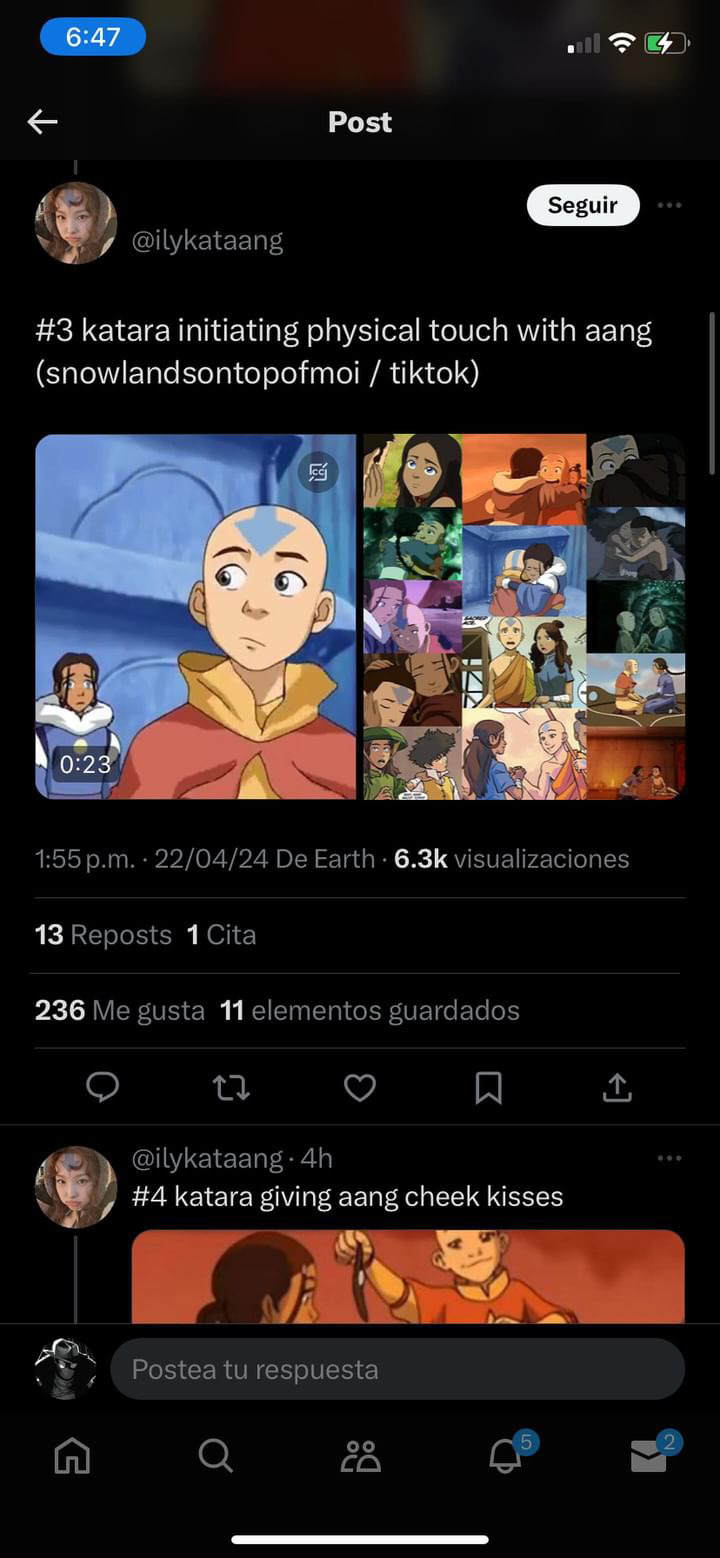
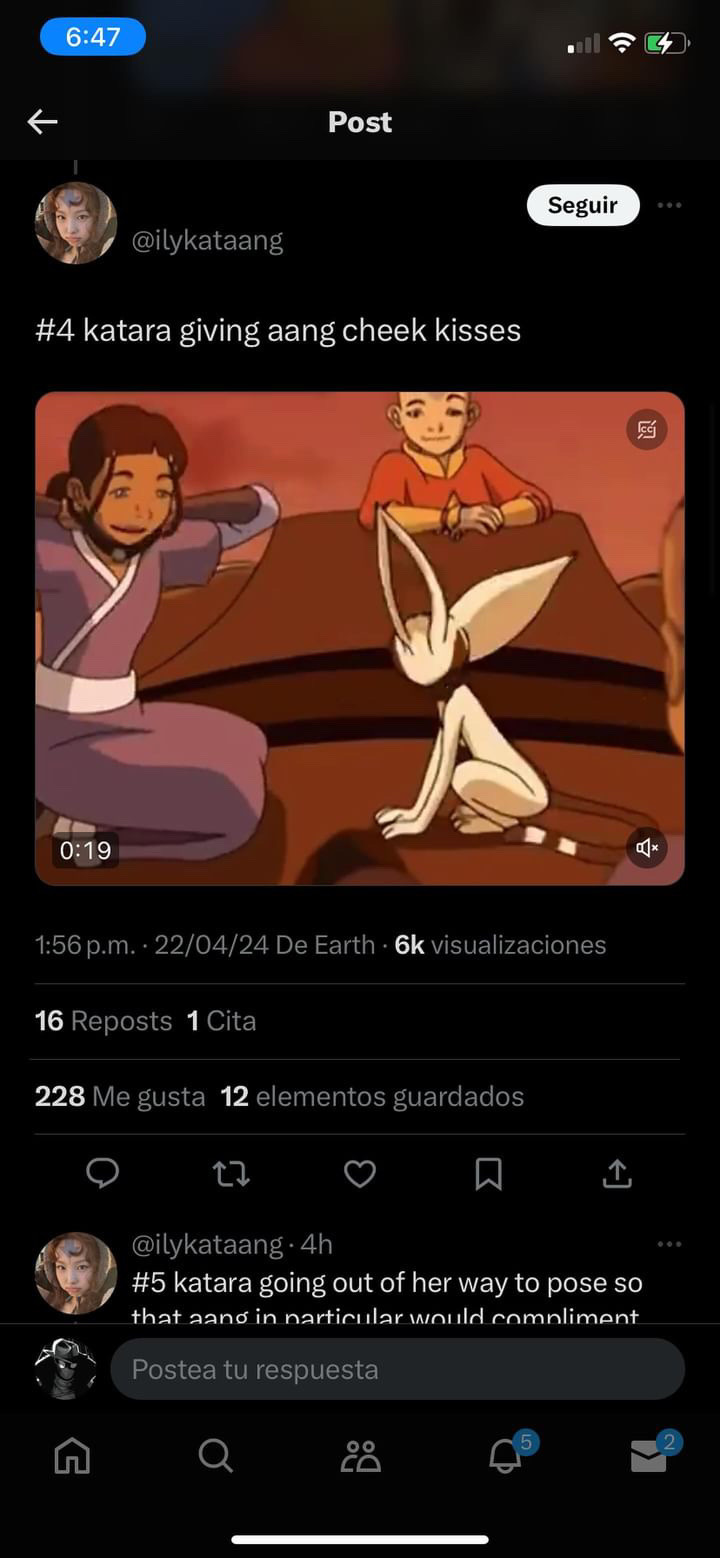
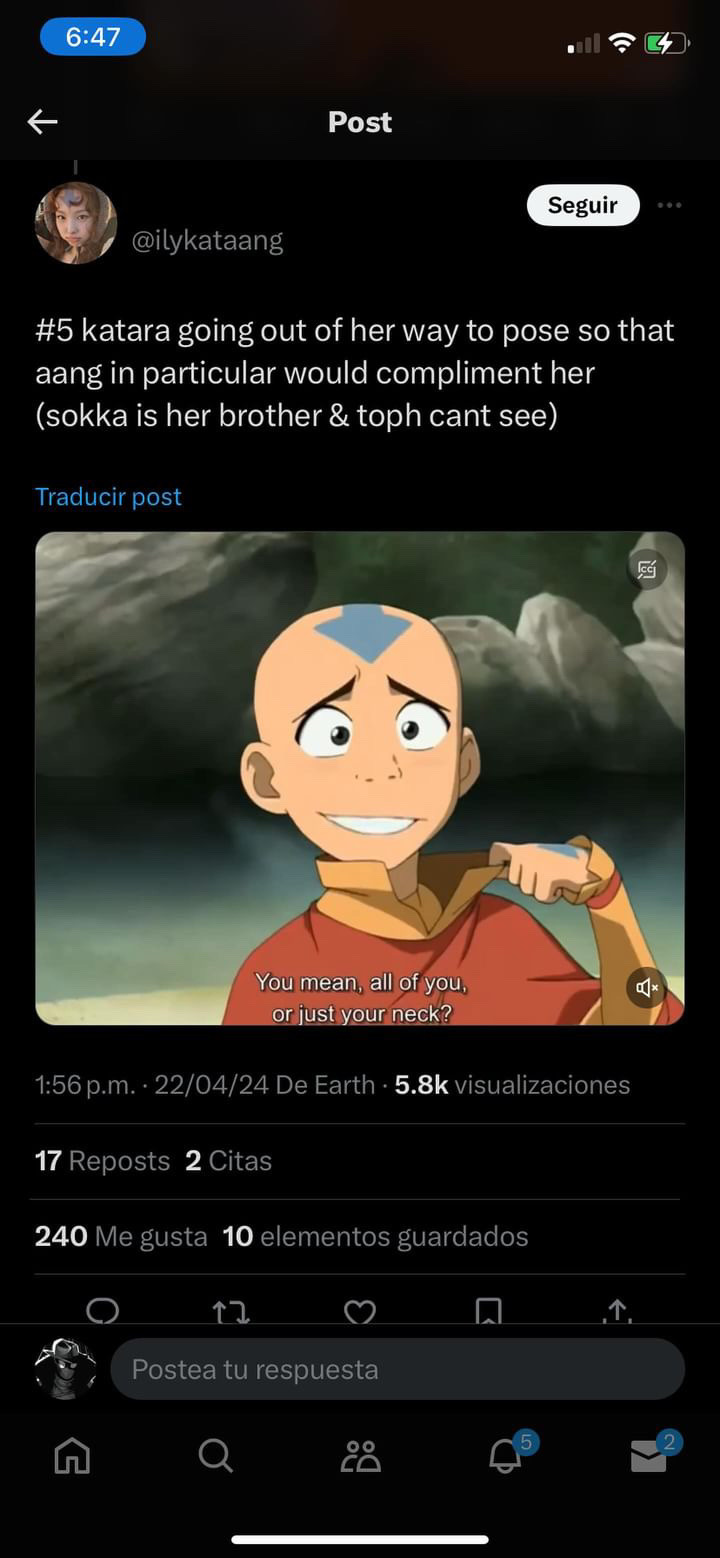
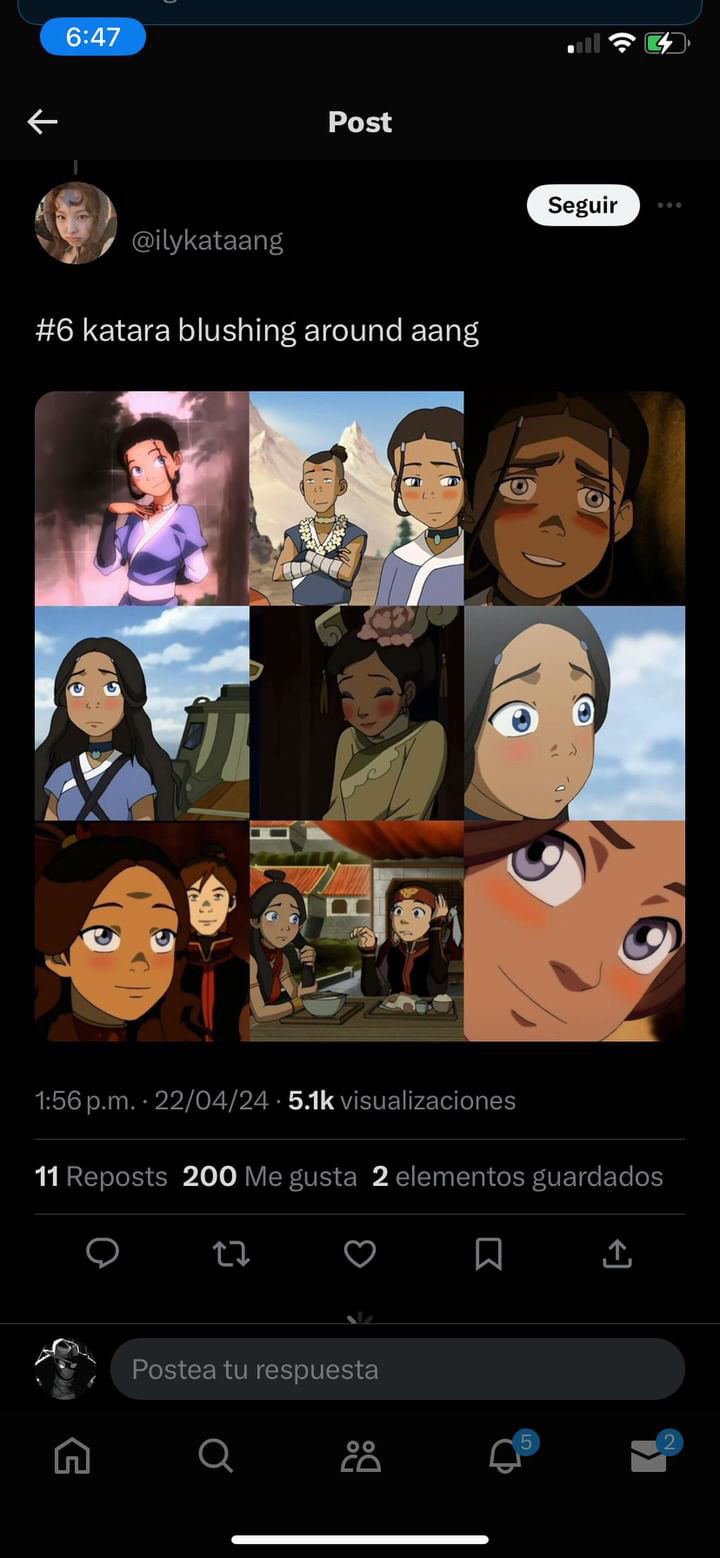

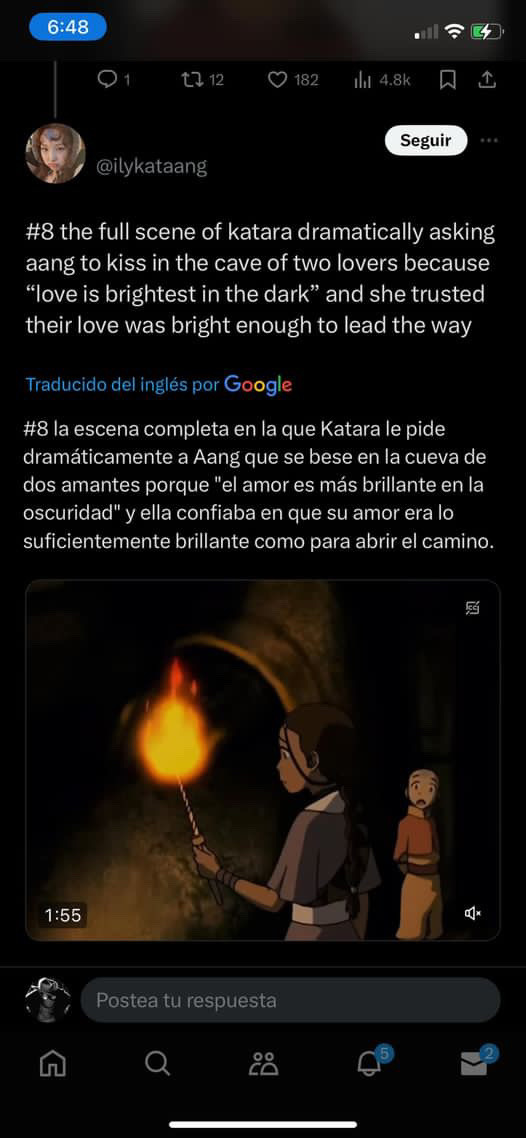
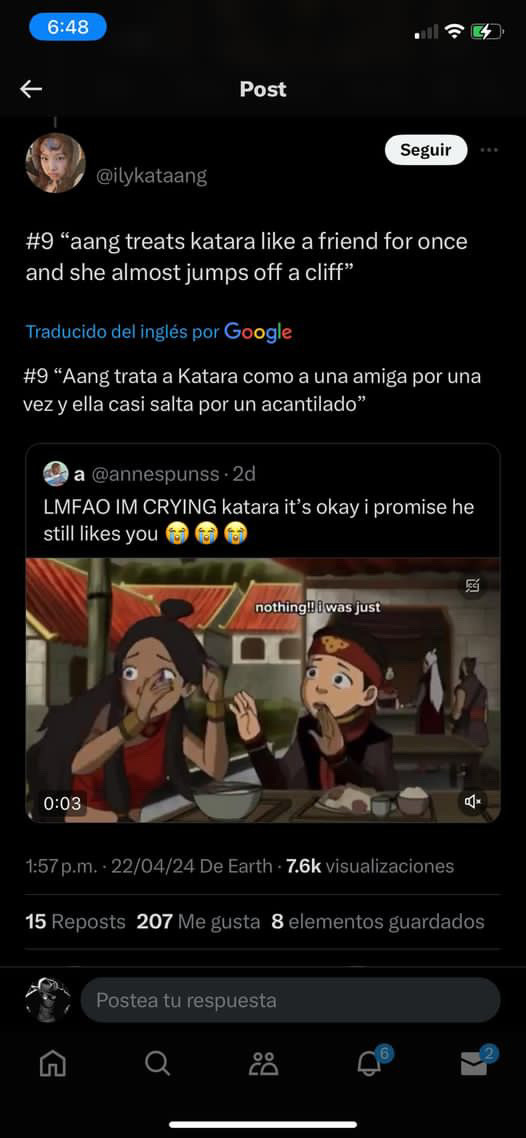
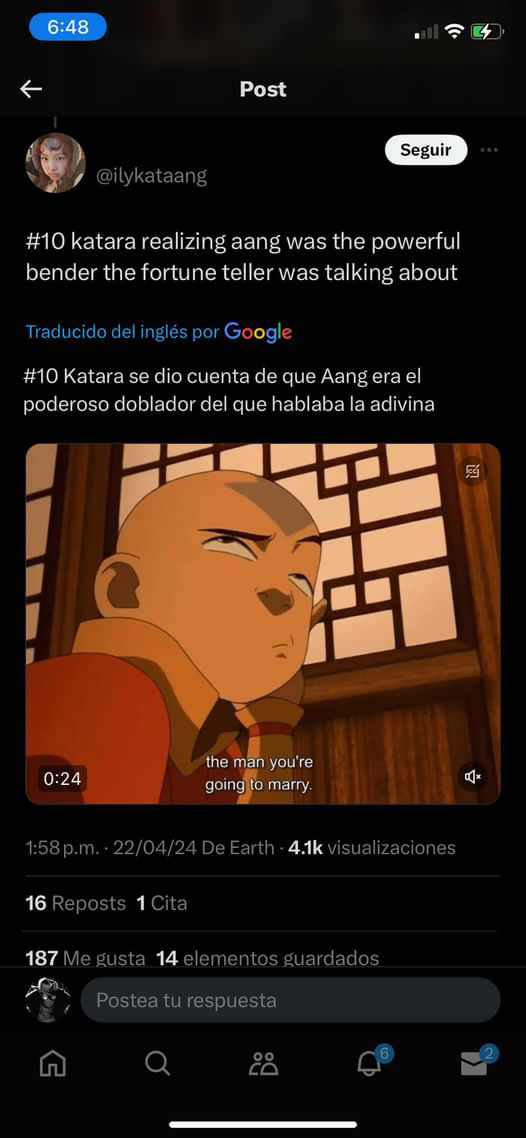
#kataang#aang and katara#katara and aang#avatar the last airbender#atla#avatar#otp#pro kataang#aang x katara#kataang defense squad#kataang analysis#atla kataang#kataang atla#kataang otp#kataang defense#anti zutara#anti anti kataang
73 notes
·
View notes
Text
My Interpretation of The Last Agni Kai
(Disclaimer: This isn't critisism of Zuko as much as it a small breakdown of the tragedy of the royal family. This post was also editted and it may not appear in reblogs).
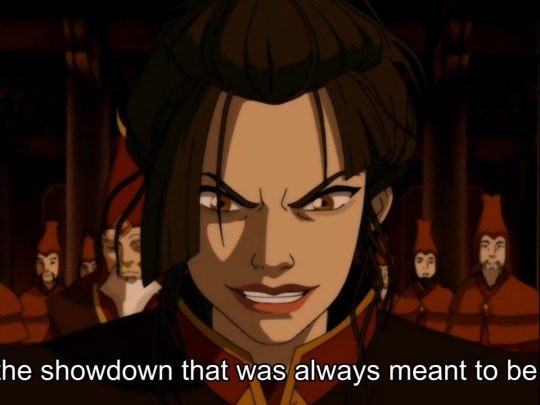
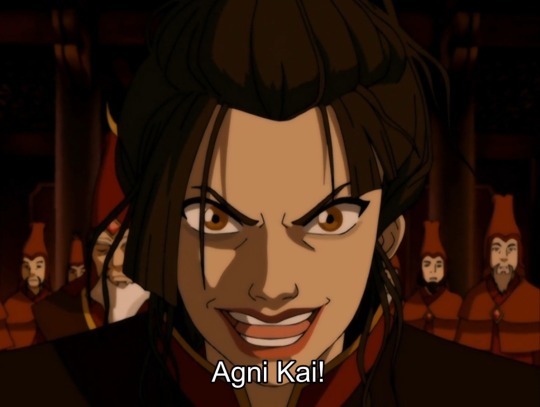
Do you hear this language? "The showdown that was always meant to be". It's somewhat true, but I'd argue that it's not because of who they are as people. It's because of Ozai.
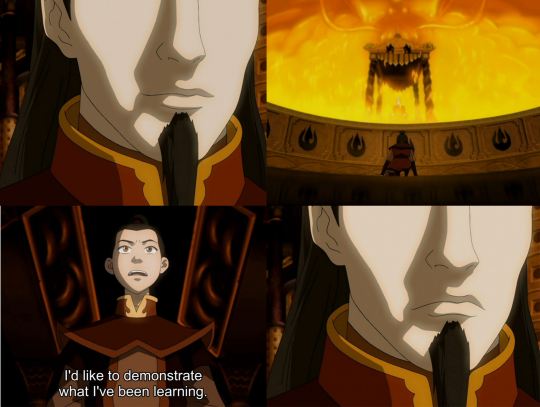
It's because they're the golden child and the scapegoat. It's because they've been put against each other by their abuser.


I would argue that she is sorry. She does love her brother, and she didn't want it to end this way. Zuko cannot see that, and he isn't sorry.
In The Beach, Zuko burns a picture of them, as a family.
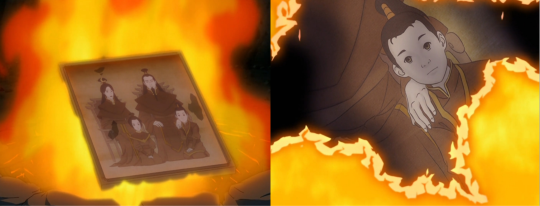
To him, the picture resresents the perfect past. Before everything went to shit. But he no longer fits there. Even though he's back. He's frustrated, he hates the world, and wants to burn it all.
Especially after he has redeemed himself, he is sure there is nothing for him. His mother is gone, his father is abusive, and Azula: the prodigy, the favored one, who belittled him from the day Ozai began to favor her. She left him in the dust while making it extra dirty. She's barely his sister anymore, she's the untouchable force making his life worse.
In Zuko Alone, Azula practically taunts him over his planned murder.
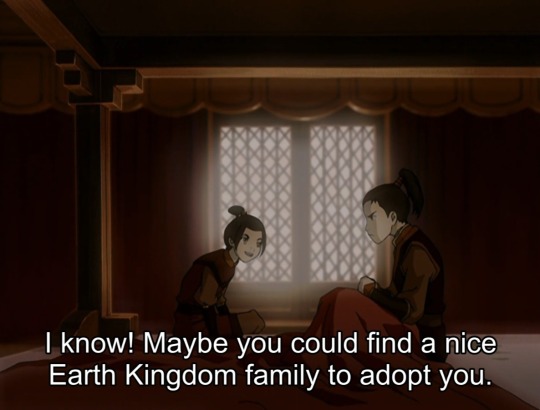
This is what Zuko sees. Not a human, not a sister, but a boogeyman. After all, Azula always lies. What he doesn't see is Azula's reaction when she realizes the situation is serious. She'll never let him see that.

Azula could have burned the bridge all those years ago, when he was banished. But she didn't. She is the reason he's back home, on that beach. Ozai was her God, she was disciplined to him and only him, even more than herself. And she lied to his face so Zuko could come back home. She's cunning, manipulative and dangerous, but she loved her brother.
Zuko can't see that. Even when "she's slipping", he can't see that. Of course he wouldn't, her love for him is overshadowed by the damage she caused him, and his envy of her. She's above him, the demon haunting him. As Ozai and their history led him to believe. And he sticks to this belief, until it's disproven.
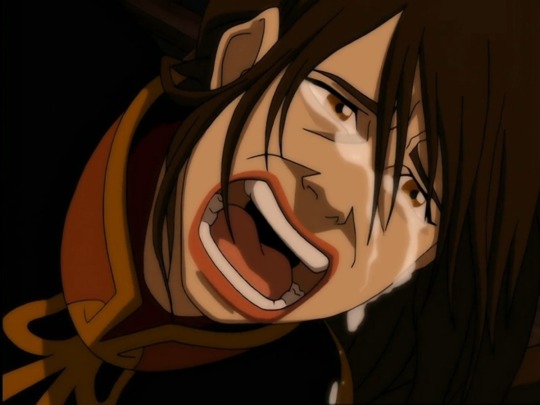
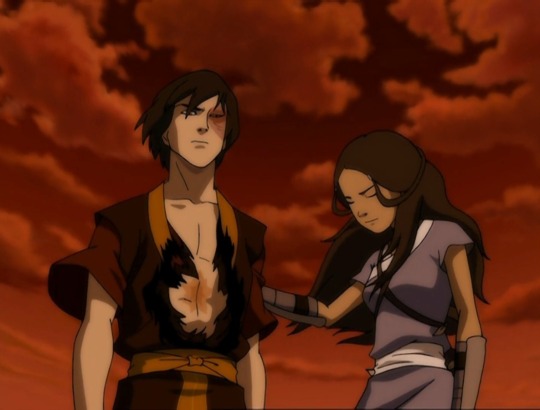
(Author's note: Azula's face here makes me want to cry, props to the animator)
She's human, his sister. And she's trurly sorry it had to come to this.
The Last Agni Kai is a tragedy. It's the story of two siblings who grew up in an abusive household, with a dad who played favorites. One made all the wrong choices, while the other could not fathom the other's humanity. They don't reconcile, they put themselves against each other. Because it's the showdown that was always meant to be. And he only recognizes it wasn't, after it's over. Now, he too, is sorry.
#next to aang's non violent solution#this sticks out like a sore thumb#tw abuse#tw child abuse#prince zuko#atla zuko#fire lord zuko#firelord zuko#zuko meta#azula meta#princess azula#atla azula#azula avatar#azula and zuko#zuko and azula#sozin's comet#the last agni kai#atla meta#atla analysis#avatar the last airbender meta#avatar the last airbender#avatar aang#avatar: the last airbender#atla#a:tla
105 notes
·
View notes